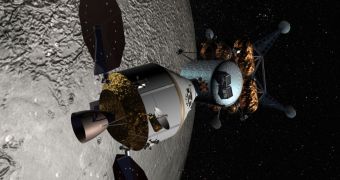Putting a man on the Moon in 1969 was easy. Putting a man on the Moon today is not. I, for one, don't understand the logic of it. Do we really have to mention Mars too? According to the congressional report on NASA's replacement of the space shuttle, the Constellation Program is in serious danger of failing even before the first spacecraft is even launched into space.
The Constellation Program is scheduled to launch its first spacecraft by 2015; however, engineering and mechanical problems may cause the scheduled date to be missed. For example, the Orion Crew Exploration Vehicle was supposed to use a heat shield very similar to that used during the Apollo program in the late 1960. Anyway, the engineers were unable to replicate the material. How this performance was possible, is beyond my understanding. The Ares I Crew Launch Vehicle is now experiencing vibrations so powerful that it will probably shake itself to pieces before even reaching space.
"If something goes wrong with the development of the Ares I or Orion, the entire Constellation Program could be thrown off course and the return to human spaceflight delayed," says the report.
Both vehicles are much heavier than stated in the design, and there are no testing facilities for the new engine of the Ares I launcher nor for studying the vibrations. "All these unknowns, as well as others, leave NASA in the position of being unable to provide firm cost estimates for the projects at this point."
Additionally, because the space shuttle will be retired, NASA will have to dispose of 5,800 and 7,300 jobs in the next three years.
Underfunding
"From its beginning, NASA's Exploration initiative has suffered from chronic under-funding, with a 'once-in-a-generation' project to develop a new space transportation system 'shoehorned' into a NASA budget that in some years hasn't even kept pace with inflation," said the head of the House of Representatives subcommittee on Space and Aeronautics, Mark Udall.
"Each year since 2004 when the Vision was announced, the NASA budget has fallen short of that required to achieve the mandated exploration goals and milestones. In short, there is a mismatch between aspirations and appropriations that no amount of spin can disguise," said professor at the University of Virginia, Kathryn Thornton in a submitted testimony.
According to the GAO report, the economy of global space economy exceeds today 220 billion US dollars, and is growing rapidly. NASA is an integral component of this global economic engine. Meanwhile, private aerospace companies earn billions every year from contracts with NASA.

 14 DAY TRIAL //
14 DAY TRIAL //